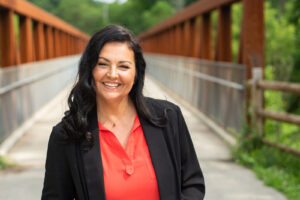It’s no secret that cancer treatment in America can be costly. Even with insurance, one’s bill doesn’t include travel to receive quality and often lifesaving treatment. When Michelle Walder was going through cancer treatment at New York University and Memorial Sloan Kettering in 2017, she found herself meeting fellow patients from across the country—and sometimes, across the globe.
“I had met patients who would drive from North Carolina every two weeks for treatment and then stay in a New Jersey parking lot in their car overnight because they could not afford to stay in a hotel,” Walder shares. “I also met patients from as far away as India and the United Arab Emirates who were all staying in hotels or with friends and family.”
Although she lived in New York City at the time, Walder herself had to stay in a hotel for a month after completing a stem cell transplant. Her building was undergoing construction that could have been damaging to her vulnerable immune system. A friend helped Welder get a discounted hotel rate that allowed her to stay safe during her building’s construction.
This experience made Walder found The C Card in 2020. The C Card is a free membership website that serves as the connection point between cancer patients and caregivers to New York City hotels offering reduced room rates. Currently, there are 12 hotels signed on as partners with more on the way. Hotels discount their daily rates anywhere from 10 to 40 percent in addition to providing complimentary amenities to The C Card members.
Walder has a long history working in hospitality, an industry she fell into by default when she started working at her parents’ small hotel and restaurant at 13 years old. She went on to study hospitality management full time in Lausanne, Switzerland. Walder’s work has taken her from New York to Miami, Shelter Island to Los Angeles and Las Vegas to Washington D.C. Currently, Walder works as the director of operations for the NoMad London.
Hotels provide a safe escape from reality even if it is just for an overnight trip, and that alone can help the healing process tremendously.
While there are other organizations such as Hope Lodge and Joe’s House that provide or help connect cancer patients with places to stay while traveling, Walder notes the process can be lengthy. Time is not always a luxury that cancer patients have.
“These programs do require some paperwork from a patient’s medical team, making it take some time to finally be able to actually book a stay,” says Walder. “Being in hospitality, my mind naturally would wonder whether there was any way we could help provide safe and clean rooms to more patients that need housing in a quick and uncomplicated way.”
Using The C Card is designed to be easy for those who need it. Hospital social work teams and nonprofit organizations privately promote The C Card to those who would benefit from its perks. From there, patients and caregivers are able to sign up for free and immediately start using the service. Users are able to view links to each hotel and The C Card discounted rates directly within the portal.
There’s no time limit on The C Card membership because, as Walder notes, cancer is a lifelong disease that requires ongoing testing and maintenance, even after a patient completes treatment. Walder also wanted there to be a way for cancer patients and survivors to access a place where they could rest and restore.
“Another thing I learned during my own cancer journey is how therapeutic a short getaway can be,” says Walder. “Hotels provide a safe escape from reality even if it is just for an overnight trip, and that alone can help the healing process tremendously.”
For now, The C Card is available only in partnership with New York City hotels. New York City is a hub for cancer treatment and medical innovation. Walder notes that New York City also provides access to clinical trials and treatments that may not be available in other cities or countries. However, The C Card is still looking to spread its reach outside The Big Apple.
“We would love to expand to other cities in the next few years,” says Walder. “With the success of The C Card in New York, we have realized that we would be able to easily expand the service to other cities such as Boston, Houston, Los Angeles, Cleveland, London.”
No matter how independent a person may be, cancer is tough to get through alone. Having gone through cancer treatment herself, Walder had to learn that it is OK to sometimes pull “the C Card.”
“Having been a patient myself, I had a very hard time letting other people help me,” says Walder. “In my line of work, I am constantly taking care of guests and co-workers. Therefore, it was a struggle to let my guard down and give up some of my independence. Once I realized that I couldn’t get through cancer alone and that allowing others to help me actually helped them in return, getting through treatment became easier. The partners that work with The C Card want to help and are happy to do so.”
To learn more about The C Card and to sign up as a user, visit theccard.org.







